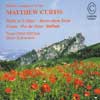Curtis, M Orchestral Works
An enjoyable survey of a contemporary composer unafraid to write tunes
View record and artist detailsRecord and Artist Details
Composer or Director: Matthew Curtis
Genre:
Orchestral
Label: Cameo
Magazine Review Date: 3/2003
Media Format: CD or Download
Media Runtime: 77
Mastering:
Stereo
DDD
Catalogue Number: CAMEO2015

Tracks:
| Composition | Artist Credit |
|---|---|
| Fiesta |
Matthew Curtis, Composer
Gavin Sutherland, Conductor Matthew Curtis, Composer Royal Ballet Sinfonia |
| Amsterdam Suite |
Matthew Curtis, Composer
Gavin Sutherland, Conductor Matthew Curtis, Composer Royal Ballet Sinfonia |
| Pas de Deux |
Matthew Curtis, Composer
Gavin Sutherland, Conductor Matthew Curtis, Composer Royal Ballet Sinfonia |
| Paths to Urbino |
Matthew Curtis, Composer
Gavin Sutherland, Conductor Matthew Curtis, Composer Royal Ballet Sinfonia |
| Two Pieces for Small Orchestra |
Matthew Curtis, Composer
Gavin Sutherland, Conductor Matthew Curtis, Composer Royal Ballet Sinfonia |
| Outward Bound |
Matthew Curtis, Composer
Gavin Sutherland, Conductor Matthew Curtis, Composer Royal Ballet Sinfonia |
Author: Ivan March
Fortunately, melody is now coming back into fashion, so this collection of the light-hearted music of the Cumbrian composer Matthew Curtis (b1959) can expect to receive a warm welcome. It opens with the scintillating concert overture, Fiesta, which has a most beguiling secondary theme; Curtis’s style is in the best traditions of Eric Coates, Haydn Wood and other British composers, about whom Andrew Lamb wrote so enthusiastically in last November’s ‘Collection’. Coates is the strongest influence, structurally, in the throbbing allegros, and in the specially English ‘tennis’ waltz (there is an engaging one in the Amsterdam Suite, which is not in the least Dutch).
Curtis can also readily create a haunting pastoral atmosphere, as in ‘Lonely City’ from the Amsterdam Suite with its winding saxophone melody (curiously reminiscent of Bizet), and there is a perky march (‘Trams and Crowds’) to round off. The ‘Pas de deux’ brings a haunting oboe melody to recall Ronald Binge’s ‘Windmill’ and the ‘Holiday Mood’ of the richly scored Paths to Urbino suite has the kind of jiggy syncopations that recall Curzon and Farnon. Its fourth movement, ‘Music of the Fields’, then brings a meltingly romantic horn solo, and the melody which follows has much in common with the cherishable central movement of Coates’s Three Elizabeths Suite, and is by no means inferior to it. Then ‘Journey’s End’ brings a deliciously jaunty Italianate (but still essentially British) tarantella, and the closing ‘Outward Bound’ makes a spirited and light-hearted finale.
I have suggested the influences of other composers, but Curtis is his own man: his scoring is particularly skilful (he writes splendidly for the horns) and his fund of invention inexhaustible. The performances are first class, the recording bright and sparkling, but the string patina suggests not too many violins (although this may be the effect of the studio recording). I would have liked more body to the violins. Highly recommendable, just the same.
Curtis can also readily create a haunting pastoral atmosphere, as in ‘Lonely City’ from the Amsterdam Suite with its winding saxophone melody (curiously reminiscent of Bizet), and there is a perky march (‘Trams and Crowds’) to round off. The ‘Pas de deux’ brings a haunting oboe melody to recall Ronald Binge’s ‘Windmill’ and the ‘Holiday Mood’ of the richly scored Paths to Urbino suite has the kind of jiggy syncopations that recall Curzon and Farnon. Its fourth movement, ‘Music of the Fields’, then brings a meltingly romantic horn solo, and the melody which follows has much in common with the cherishable central movement of Coates’s Three Elizabeths Suite, and is by no means inferior to it. Then ‘Journey’s End’ brings a deliciously jaunty Italianate (but still essentially British) tarantella, and the closing ‘Outward Bound’ makes a spirited and light-hearted finale.
I have suggested the influences of other composers, but Curtis is his own man: his scoring is particularly skilful (he writes splendidly for the horns) and his fund of invention inexhaustible. The performances are first class, the recording bright and sparkling, but the string patina suggests not too many violins (although this may be the effect of the studio recording). I would have liked more body to the violins. Highly recommendable, just the same.
Discover the world's largest classical music catalogue with Presto Music.

Gramophone Digital Club
- Digital Edition
- Digital Archive
- Reviews Database
- Full website access
From £8.75 / month
Subscribe
Gramophone Full Club
- Print Edition
- Digital Edition
- Digital Archive
- Reviews Database
- Full website access
From £11.00 / month
Subscribe
If you are a library, university or other organisation that would be interested in an institutional subscription to Gramophone please click here for further information.




